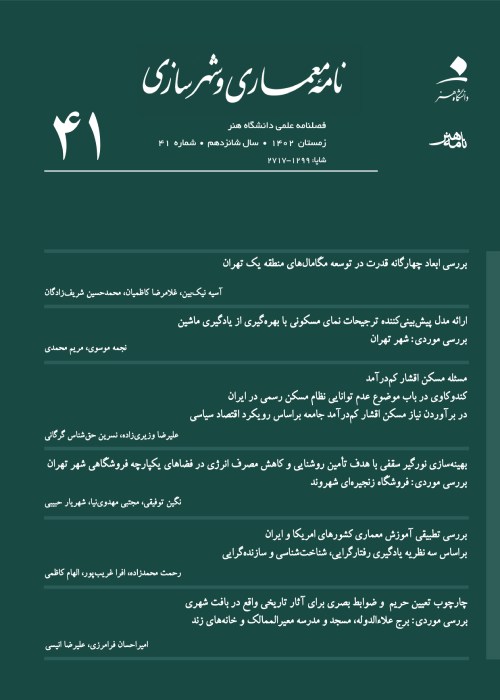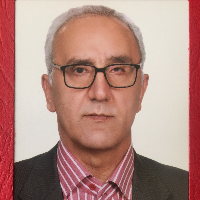Achieving Thermal Comfort in Public Spaces Using a Step-by-step Simulation Process Case Study: A Neighborhood Unit in Imam Khomeini Town, Lar
Author(s):
Article Type:
Research/Original Article (دارای رتبه معتبر)
Abstract:
The presence of citizens in outdoors can influence the liveliness of neighborhoods in the city and at the same time, can improve public physiological health. Thermal comfort, as a physiological need, is one of the most important requirements to facilitate the presence of citizens in open public spaces, which has an increasing importance especially in hot and dry climate including Lar. Therefore, one of the most important priorities in neighborhood design in such a climate is considering thermal comfort in outdoor public spaces. This research is aimed to search for principles of designing a neighborhood unit in order to provide thermal comfort in urban public spaces. The research pursues a step-by-step simulation process by which the best alternative design for achieving outdoor thermal comfort is obtained. In order to design different steps in simulating process, environmental criteria was derived from previous studies. Geometry, greenery and material that is used in building facades and on pavements, were three criteria which influence thermal conditions and are considered as simulation process steps. Achieving thermal comfort in outdoor spaces should not cause extra energy consumption for buildings, therefore finding the best orientation of buildings for reducing energy consumption in interior spaces is one of the design issues, the main point which was neglected in previous studies, and eventually in this process we optimized the orientation of buildings. In this study, ENVI-met software version 4 is used for modeling the available urban fabrics and simulating design scenarios. ENVI-met model is validated through a comparison between field measurement and simulation results. Meteorological data (temperature and relative humidity) were measured for 7 days from December 10th to December 16th 2016 in the new town area of Lar. The physiologically equivalent temperature (PET) index has been chosen to assess the space design scenarios thermally. While designing, using a step-by-step simulation process facilitated the achievement of an optimal model based on three criteria: urban geometry, greenery, and facade material. The aforementioned models were simulated between 9 A.M to 17 P.M in two days Jun 21st and Dec 21st in each step of the process. The final design has been optimized after simulating 37 different scenario models. Simulation results confirm the crucial effect of geometry on street thermal conditions. In the case study of Lar, an east-orientated street with 5 degrees’ rotation designed with two W/H aspect ratios, leads to the best thermal condition. Simulation of the neighborhood center based on greenery criteria shows that among two existing tree species of Lar, Albizia lebbeck in comparison with Palm makes better thermal conditions and reduces Physiologically Equivalent Temperature (PET) by 3.94 degrees on average. Simulation of neighborhood center based on material criteria shows a negligible effect on thermal condition of space; it approves previous studies results; thermal conditions of space in denser tree canopies with higher aspect ratio are less affected by materials of space facades and ground pavement.
Keywords:
Language:
Persian
Published:
Journal of Architecture and Urban Planning, Volume:11 Issue: 21, 2019
Pages:
77 to 99
magiran.com/p1943348
دانلود و مطالعه متن این مقاله با یکی از روشهای زیر امکان پذیر است:
اشتراک شخصی
با عضویت و پرداخت آنلاین حق اشتراک یکساله به مبلغ 1,390,000ريال میتوانید 70 عنوان مطلب دانلود کنید!
اشتراک سازمانی
به کتابخانه دانشگاه یا محل کار خود پیشنهاد کنید تا اشتراک سازمانی این پایگاه را برای دسترسی نامحدود همه کاربران به متن مطالب تهیه نمایند!
توجه!
- حق عضویت دریافتی صرف حمایت از نشریات عضو و نگهداری، تکمیل و توسعه مگیران میشود.
- پرداخت حق اشتراک و دانلود مقالات اجازه بازنشر آن در سایر رسانههای چاپی و دیجیتال را به کاربر نمیدهد.
In order to view content subscription is required
Personal subscription
Subscribe magiran.com for 70 € euros via PayPal and download 70 articles during a year.
Organization subscription
Please contact us to subscribe your university or library for unlimited access!




